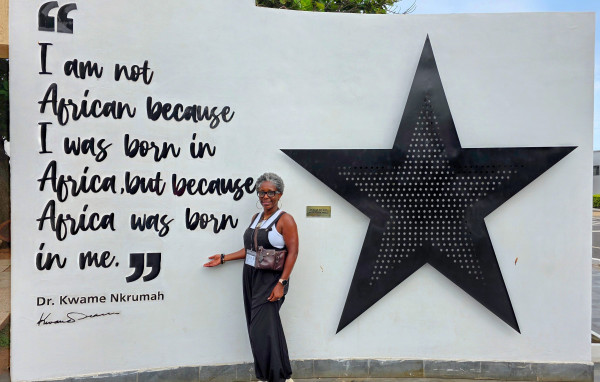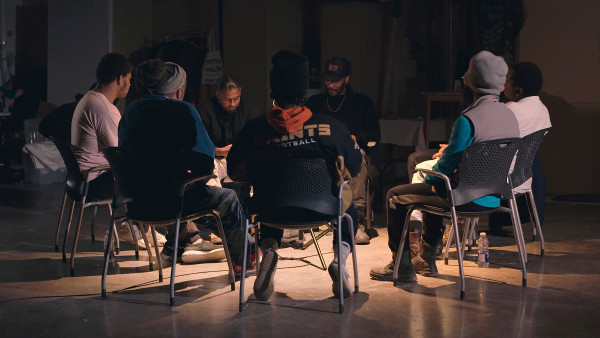After 9 years and 6 hospital stays, certain habits had fallen to the wayside. I had gained nearly 100 pounds. My sleeping and waking schedules had reversed. I hardly left my room. I ordered takeout more times than I could keep track of, only managing to place orders for food in the evenings. It was a miracle if I showered more than once a week. I dealt with frequent suicidal ideation.
During my struggle to recover, I met many caring connections who introduced me to traditional African healers and literature on the subject of traditional African healing. Accessing African spiritual healing remotely from Vancouver nourished my spirit and kept me afloat, yet I knew it wasn’t enough. I needed to relocate. I needed to be integrated into society in a way that no longer felt possible for me in Canada.
I arrived in Ghana on November 24th, and within a week, my quality of life has completely transformed. I eat three nutritious meals a day and drink so much water. My agoraphobia is now a thing of the past: I’ve become a social butterfly. I shower at least once—if not twice—a day, and I wake up at 6 a.m. each morning after a full night’s rest. Suicide is the farthest thing from my mind.
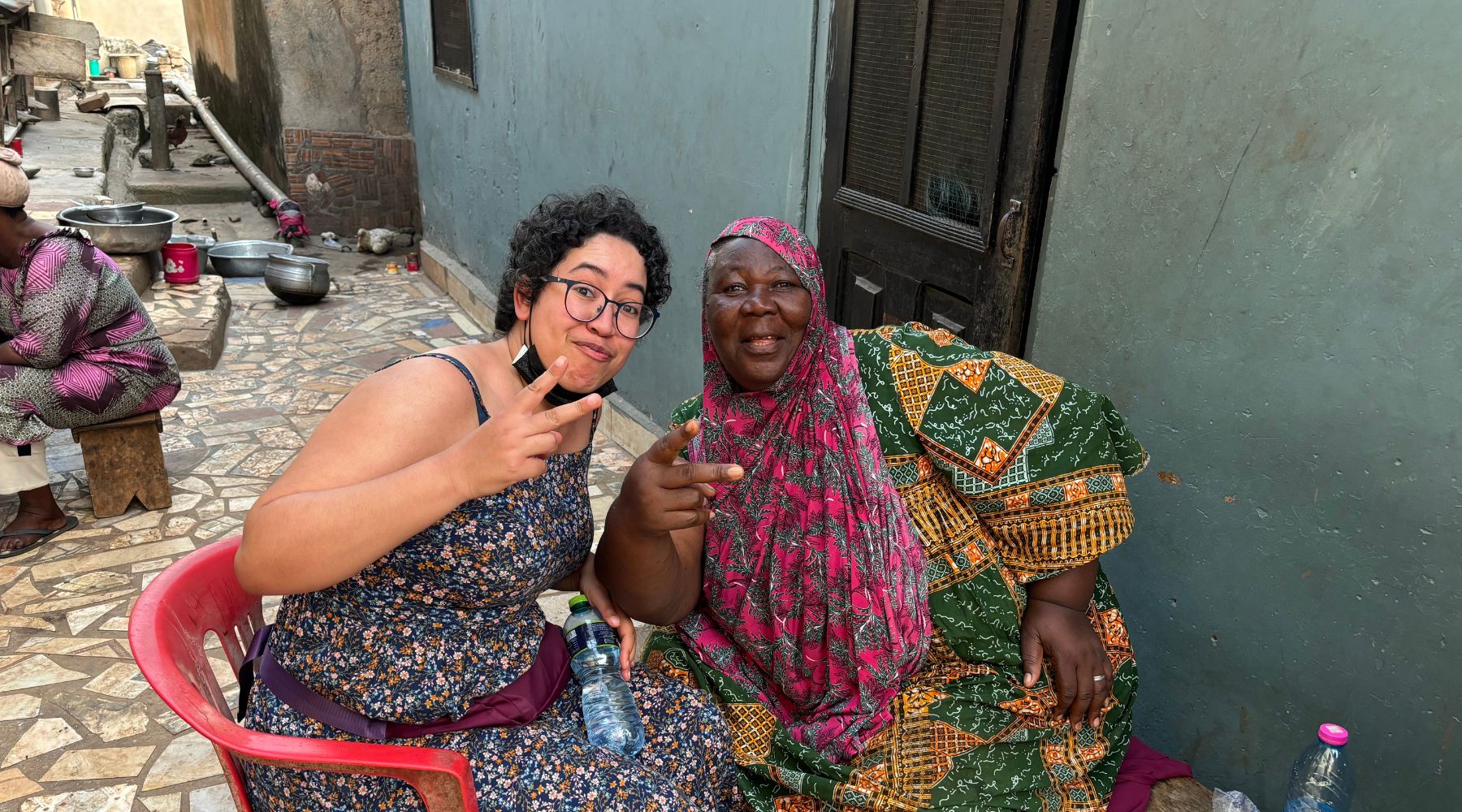 My neighbour Hajia Fati (right) posing with me in front of her house.
My neighbour Hajia Fati (right) posing with me in front of her house.
After 9 years of trying to heal, I thoroughly believe that the level of recovery that I have just described was simply not attainable for me under Global Northern conditions, given my trauma. Trying to move forward and take care of myself while living in Canada, only made me look and feel crazier.
I remember when I first moved out of the psychiatric unit at Peter Lougheed Centre in Calgary upon my return from my first trip to Ghana, which I had taken while I was acutely psychotic. I had spent 6 weeks involuntarily hospitalized in a psychiatric unit after being brought back to Canada by a distant relative.
Although I had emerged from acute psychosis, I did not feel tremendous optimism about anything that the future seemed to hold for me.
Upon discharge, I moved into the basement of a house I shared with my abuser. I filled my ample free time by binge watching American news and Law and Order: Special Victims Unit.
I was a survivor of racism and sexual abuse but these experiences had always been dismissed as mild or even normal by many white folks around me. I became drawn in by TV shows that highlighted the abnormality of racist and sexual violence. I know now this was a trauma response to an oppressive expectation that clinicians and many others in Canada seemed to hold for me: these folks expected me to re-integrate into a society that had driven me mad.
I can’t count the number of times that I called mental health support lines and services in crisis and was told to detail my coping strategies before being left to my own devices after a brief chat. Global Northern toxic individualism has too many believing that it’s fine for clinicians to give mad folks their medications or collaborate on a list of coping strategies and then leave said mad folks to their own devices under unlivable circumstances. This is supposedly sufficient mental healthcare.
In the Global North, every person is seen as responsible for caring for themselves under a system fundamentally driven by leveraging people’s basic needs over said folks to compel us to work.
As a mad person who has supported others who were struggling with their mental health as well as with houselessness, I was frequently told to take care of myself and leave these folks to do the impossible. What if Canadian mental health systems invested the amount of time, energy and money spent on self-care advocacy and sanitized mental health educational literature actually trying to provide for oppressed and mad people? That would be “progress,” in my humble opinion.
Moving to Ghana has truly opened my eyes to just how badly many Global Northerners misunderstand mental health.
Many Global Northerners believe that madness is a purely chemical phenomenon. I emerged from hospital stays to be welcomed to a reality where my psychotic experiences were meaningless and I was expected just to accept this and find a job. Having a job is considered both medicinal and a sign of recovery among many clinicians in the Global North.
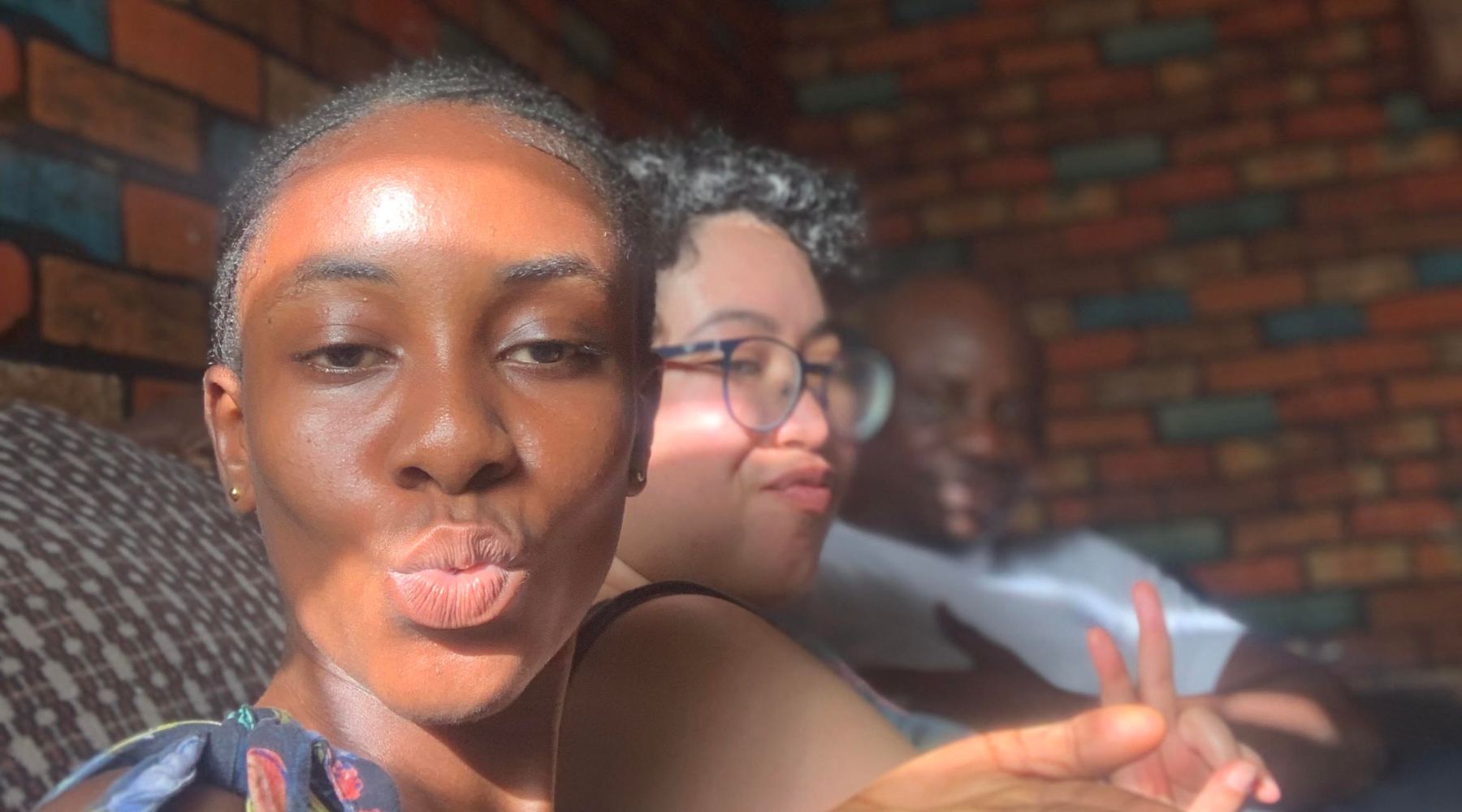 Me (middle) in Kumasi with my cousin Rosemond (left) and my uncle Victor (right)
Me (middle) in Kumasi with my cousin Rosemond (left) and my uncle Victor (right)
It was African connections in the Global South that validated my sense that my psychotic experiences are worth taking seriously. A sangoma and a Ghanaian herbalist shared with me traditional understandings of what is hegemonically known as madness. Learning from them has enabled me to see the light in my life. Medication has been a valuable tool for me and I would not advocate against its use, but traditional approaches to healing have meant the difference between Akos the hopeless recluse and the bubbly social butterfly who roams the streets of Kumasi today.
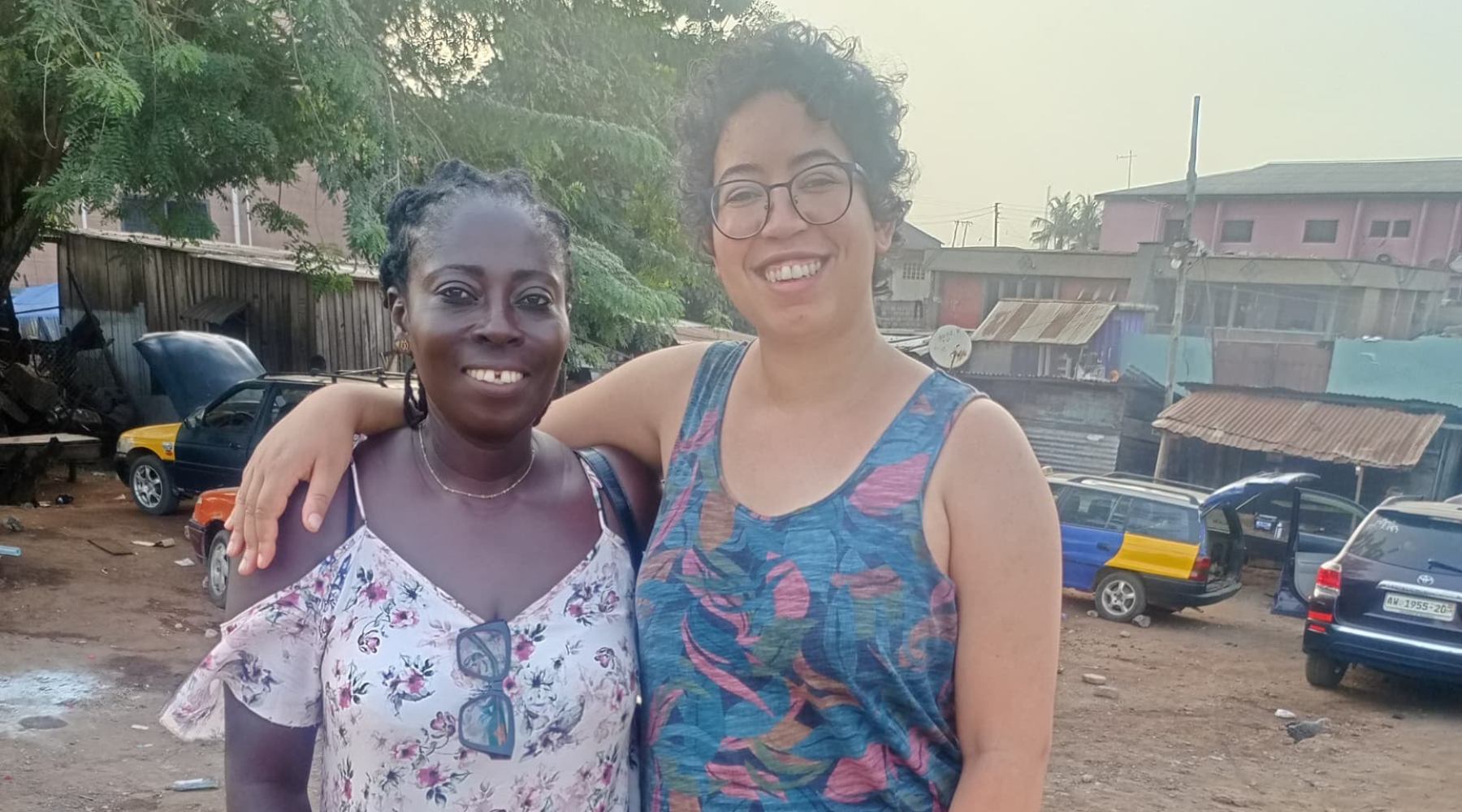 My Aunty Yeboah (left) with me in Aboabo, Kumasi.
My Aunty Yeboah (left) with me in Aboabo, Kumasi.
For a number of years after my psychotic break and before my move to Ghana, I lived a hermit’s life. Physical and virtual spaces that I had once visited without a care in the world suddenly became networks of back alleyways in the nighttime where inestimable dangers lurked.
Things got to the point at which I seldom left my room and couldn’t watch TV or tolerate other people’s sounds. My mom attributed this change to autism. I have yet to be diagnosed with autism.
At home in Ghana, I hear background sounds most of the time. The fridge beeps at night, the clock ticks audibly, the TV is always on, and prayers and singing can be heard as if they were broadcast into our home via an intercom. None of this bothers me. In fact, the prayers and singing bring me comfort, even though I can’t understand them, as they are not in English.
When I was still in Canada, I told my mother that my problem wasn’t that I felt overstimulated, it was that I was constantly anticipating triggers and trying to protect myself from them. She didn’t believe me.
Truthfully, I faced a lot of pushback when I told friends, family and clinicians that I needed to move to Ghana to heal. I was met with the concern that my problems would inevitably follow me to the place that I hoped would be my sanctuary. One care worker even asked if I wasn’t just trying to run away from something that would inevitably catch up to me.
As I withdrew from society in Canada, my family members doubted my capability to take care of myself anywhere—let alone thrive in my paternal homeland.
I had to save up money that my mom had sent me and sneak off without telling most of my Global Northern family members—to keep them from intervening and to avoid all their negative talk about how things would go wrong for me in Ghana. My relationships with certain family members became even more strained when my family realized I was making serious plans to leave and created a texting group to control my spending.
But all of these trials proved to be temporary and surmountable. I made it to Ghana, and since then, I have experienced care and community like never before.
I live with my uncle and my two cousins in a compound-house-esque complex in Kumasi. Every day, I am surrounded by friendly, warm, and loving people.
Each day, I wake up to a hot breakfast prepared by family members. They do the cooking and cleaning and remind me to eat, shower and take my medication. I tried to suggest that I take on more of a role in maintaining myself and the household, but they have insisted that I don’t. I’m very appreciative of this and happy to be cared for in this way until I can get back on my feet.
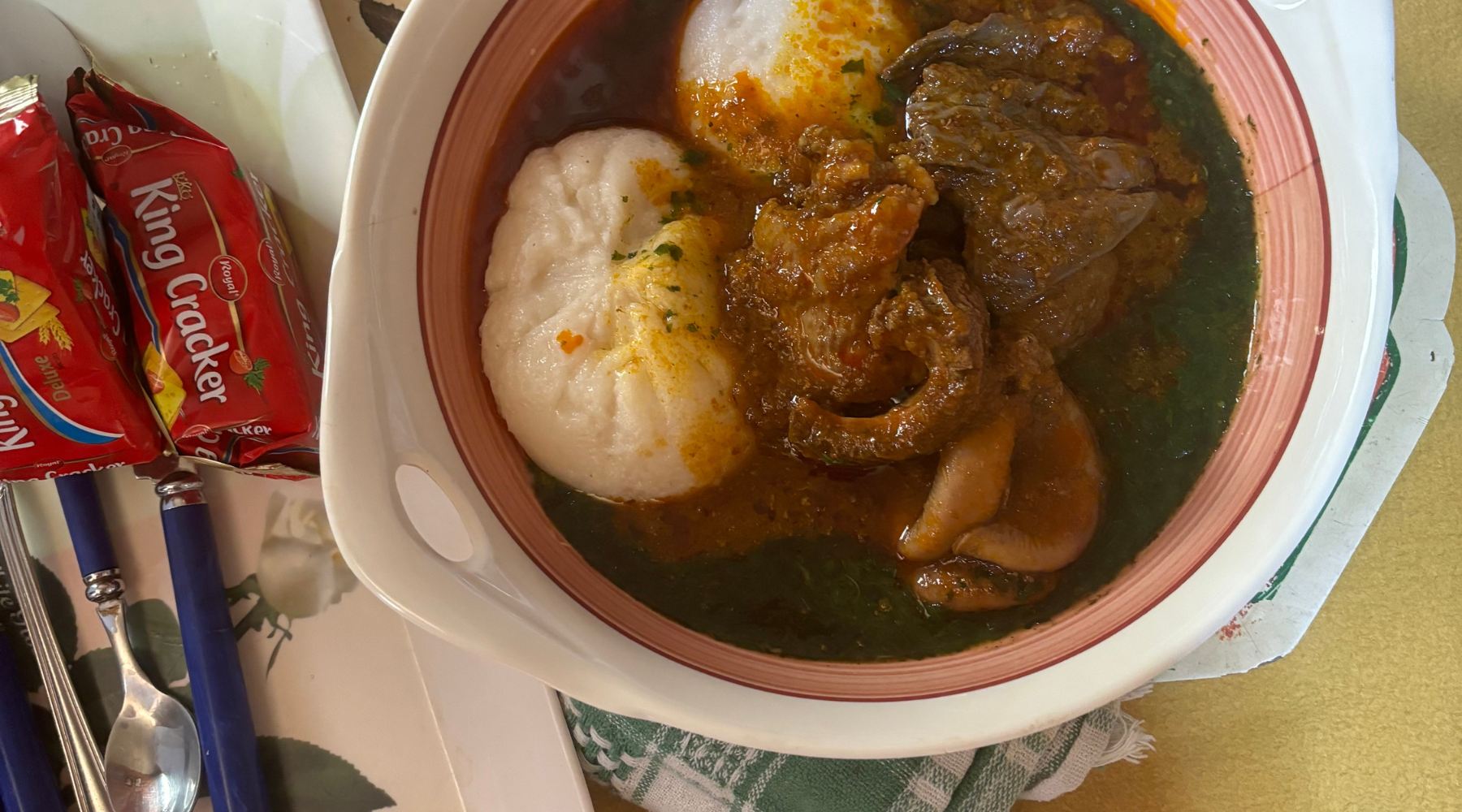 Tuo zaafi a Ghanaian dish
Tuo zaafi a Ghanaian dish
In Kumasi, for me, there is an incentive to walk. There is fresh fruit year-round. I can more easily live in a way that honours the sanctity of the natural world. I don’t feel inclined to order food deliveries every night.
The person who once feared to leave his room is a thing of the past. In Canada, I used to be afraid of overhearing white folks saying racist and appropriative things. There are virtually no white folks here.
I am seen as white here and I know that colourism has everything to do with how favourably I am perceived in Ghana. I loathe colourism and am committed to doing everything I can to undermine a system that unjustly disadvantages dark-skinned folks. But I feel at home in a way that I haven’t for the past 9 years. Whatever I have sacrificed to live here, for me, it has been beyond worth it.
I still follow a thorough medication schedule, but my need to go to Ghana was not a frivolous add-on to medication and self-care, it was about attaining a lifestyle that is profoundly vital to my wellness. “Cultural sensitivity” is meaningless if it is merely code for the creation of more superficially diverse mental health campaigns and the hiring of more doctors of colour who have been trained in the same individualistic, Eurocentric, trauma-insensitive approaches.
Canadian mental healthcare was, in many ways, a source of madness for me. Because, when I became that crazy Black person who resented my way of life in Canada, people acted as if I was the problem. It’s easier to accept that one person is a problem than to confront the possibility that a whole society is unlivable for specific members. This is what it means to be minoritized. This is what it means to be socially dead.
In Canada, I once called a mental health service in a profound state of crisis, only to be talked at about the benefits of bullet journaling for the rest of the call’s brief duration. Pushing self-care on people in crisis isn’t due diligence; it’s laziness and neglect. All I wanted in that moment was to be listened to. Instead, I got an unneeded lesson in something that I have known how to do since the 4th grade.
From what I have seen, Canadian carceral mental health systems show little evidence of a genuine desire to transform. The expansion of MAiD and the cooptation of self-care testify to that.
I believe that Global Northern societies are fundamentally based on broken systems. Not only are they environmentally destructive, they are mentally disturbing.
To Black folks in Canada who know there is something better, you are not wrong. You are not extreme or dramatic. You are living in a crazy world. You are tuned into your heart and your body’s needs. You deserve to meet your needs and find community and love.
To build a world that truly accommodates ourselves and all beings, we must look beyond Global Northern systems and structures. I am healing in Ghana in a way that I never did in Canada. I am immensely grateful.
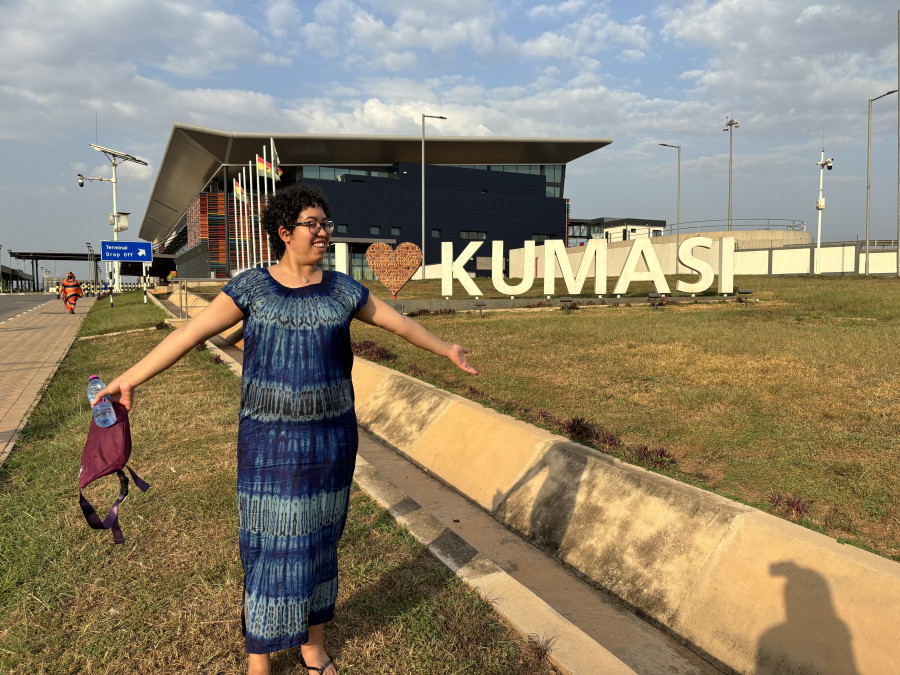
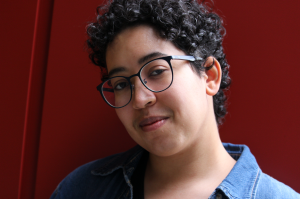 By
By 






